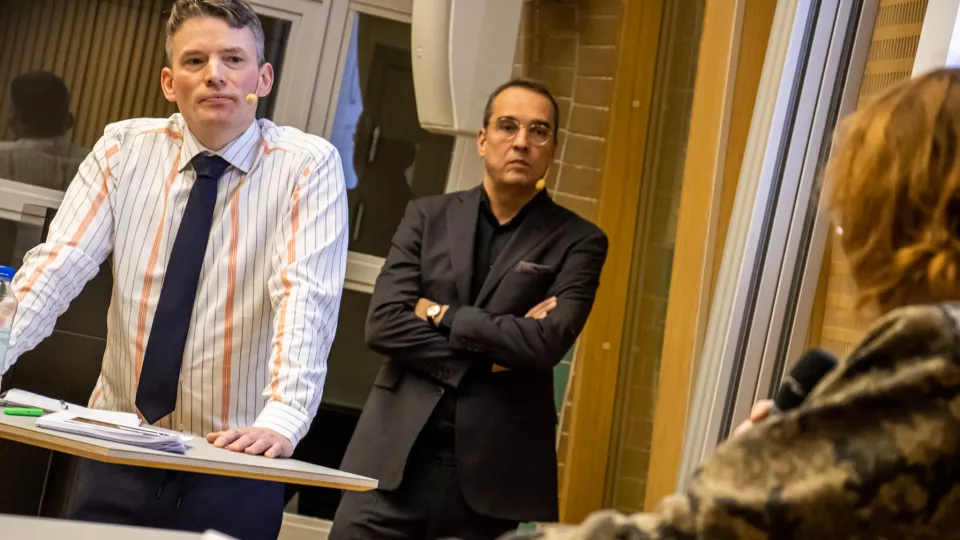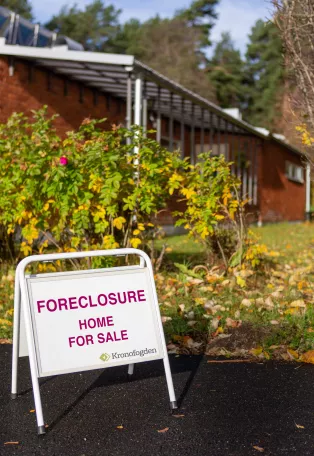Mikael Lundholm’s thesis defence was the Sociology of Law Department’s first on-campus since social restrictions were prescribed at Lund University in the spring of 2019 to mitigate the spread of coronavirus. Between 20 and 30 online viewers accompanied the roughly 60 persons physically present at the defence of a thesis aiming to understand the social contingency of social control responses during foreclosure.
Foreclosure is the forced sale of property owned by a debtor unable to pay mortgages or other debts. Lundholm, a senior enforcement officer at the Swedish Enforcement Agency (Kronofogden) and specialised in the foreclosure sale of real estate, noted that only one in four foreclosure sales initiated ended with the selling of the property. Of the homes sold as foreclosure, many go for less than the market value and do not generate enough money to cover the mortgage. This, Lundholm observes, is contradictory to the aim of foreclosure: payment of the debts and avoiding losses for the debtor.
“If we don’t have compensation, what do we have? Then [foreclosure] is just a punishment,” Lundholm said in discussion with Bengt Larsson, professor of sociology at the University of Gothenburg and the external reviewer of the thesis. He expands on this notion in the thesis introduction:
“Overall, from my professional perspective, it seems questionable whether foreclosure as a legal institute is suitable for securing compensation in the Swedish context.”
With his research, Lundholm wanted to find out if the law and other means of social control are contingent on differences in social status. To this end, he studied three specific cases using the theories of American sociologist Donald Black.
In the first case, he found that more contact between the lender and the borrower is associated with more revocations of foreclosure sale proceedings at Kronogden by the lenders. This means that the house is not sold by Kronofogden and indicates that the lender and the borrower reach some form of agreement.
The second case showed that borrowers with higher socioeconomic status tend to acquire more money in foreclosure cases. For these borrowers, foreclosure to a higher degree achieves compensation in the sense that the debts are paid.
Third, Lundholm confirmed that Swedish mortgage lenders collect debts from delinquent mortgage loans differently. These variations are associated with more or less negotiation between the lender and the borrower about solutions avoiding the forced sale of the house.
Lundholm concluded that law is applied differently to people based on social factors like foreign background, education, wealth, integration, and relational distance and that these statuses affect the outcomes of foreclosures.
It took eight years to finalise the research project as Lundholm pursued his PhD on half time due to his professional engagement at the Swedish Enforcement Agency (which also funded the PhD).
“I think you should be proud of this work,” Professor Bengt Larsson said. The examining committee seemed to agree with Larsson and unanimously passed Mikael Lundholm’s thesis.
Download and read Mikael Lundholm''s thesis "The Social Contingency of Law – Studies of Social Control during Foreclosure in Sweden" (pdf, 4.12 MB).
External Reviewer
Professor Bengt Larsson
Department of Sociology and Work Science, University of Gothenburg
Examining Committee
Professor Åsa Gunnarsson
The Faculty of Social Science, Umeå University
Professor Stefan Sjöström
Department of Sociology, Uppsala University
Professor Anna Lundberg
Sociology of Law Department, Lund University
Chair
Professor Måns Svensson
School of Education, Humanities and Social Sciences, Halmstad University


